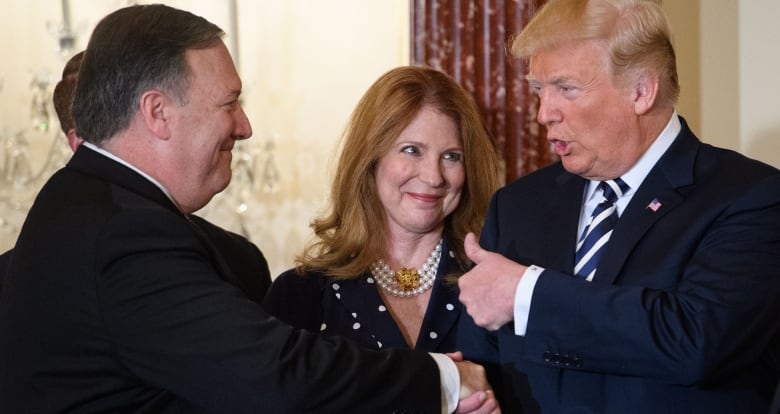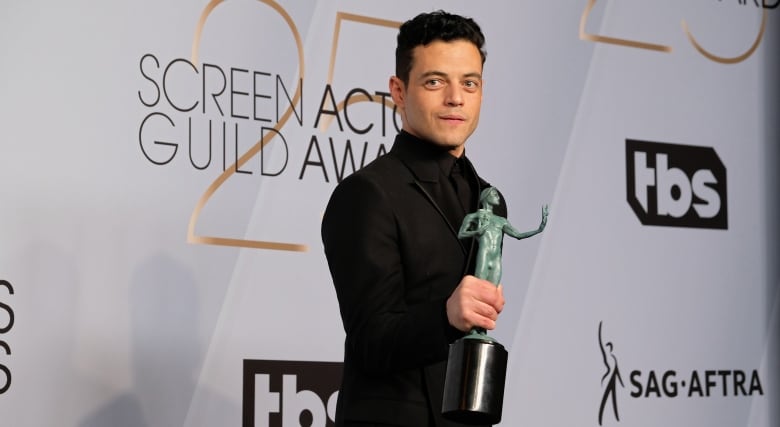Life after Trump: From Spicer to Omarosa, what people are up to since exiting White House inner circle
Newsletter: A closer look at the day's most notable stories

Welcome to The National Today newsletter, which takes a closer look at what's happening around some of the day's most notable stories. Sign up here and it will be delivered directly to your inbox Monday to Friday.
TODAY:
- Former Trump-administration staffers have ended up in some interesting places.
- Why it's hard to ask the hard questions in Hollywood these days.
- A bluegrass band in Alberta has faith that music can turn the province's economy around.
- Missed The National last night? Watch it here.
After Trump's White House
Sean Spicer, Donald Trump's former White House spokesman, has finally found a new gig — a special correspondent for the celebrity-obsessed television show Extra.
The 47-year-old has been revisiting his Washington haunts for what are being billed as a series of exclusive interviews with "Trump's biggest power-players."
The brief segments debuted on Wednesday with a behind-the-curtain look at U.S. Secretary of State Mike Pompeo, his wife Susan and their dog Sherman.
The revelations were in keeping with the syndicated program's gossipy tone — the pair miss Kansas, love the Oscars, and America's top diplomat has a playlist filled with AC/DC, Queen and Toby Keith.

Last night, it was Kellyanne Conway's turn.
"What do the kids think of having a famous mom?" Spicer probed.
And this evening, current White House spokesperson Sarah Sanders and her husband Bryan will have their softball session.
Serving as a presidential spokesman has traditionally been a golden ticket in the United States.
George Stephanopoulos parlayed his experience handling the press and advising Bill Clinton into a career with ABC News, where he now hosts both This Week and Good Morning America, and serves as the network's chief anchor, at a reported salary of $15 million US to $17 million a year.
Ari Fleischer, George W. Bush's press secretary, now runs his own communications firm that offers training, advice and plots media strategy for clients that include the NFL, NBA, Pfizer and the U.S. Olympic Committee.
And the trio who served over Barack Obama's two terms — Robert Gibbs, Jay Carney, and Josh Earnest — are now, respectively, senior executives with McDonald's, Amazon and United Airlines.
But Spicer, who worked on Trump's campaign and then served six tumultuous months at the White House — during which his was mercilessly lampooned by Melissa McCarthy on Saturday Night Live — has had a rockier transition.

His sunny retelling of his time with Trump, The Briefing: Politics, the Press, and the President, was savaged by critics and his launch events drew protestors.
The memoir did briefly make it onto the New York Times and Wall St. Journal best-seller lists, but quickly lost momentum. It currently ranks as the 130,757th best-selling book on Amazon.com, although it is number 261 with a bullet in the Russian and Former Soviet Union sub-category.
(Spicer is flogging personalized and autographed copies of the book on his website for just a couple of dollars more than its $28.99 list price.)

He had a political podcast with a Fox News contributor, Katie Pavlich, but the last new episode was posted in December.
And a talk show proposal, Sean Spicer's Common Ground, which would see him interview famous people in informal settings, has been floating around Hollywood since last summer, but has yet to catch on.
Other Trump veterans haven't had the same struggle.
Josh Raffel, who served as deputy communications director, is now the vice-president of corporate communications for Juul, a much-hyped e-cigarette maker.
Hope Hicks, who channeled Trump during the campaign and then advised him in Washington, is now the head of PR for Fox, solidifying the lend-lease arrangement between Rupert Murdoch's empire and the White House.

Although Spicer is arguably doing better than Omarosa Manigault Newman, whose career arc has taken her from The Apprentice to the Oval Office and now back to reality television, most recently as a guest host on Celebrity Big Brother 2.
Spicer has expressed hopes that his open-ended arrangement with Extra will help spark interest in his talk show pitch.
The early returns aren't all that promising, however.
As of early afternoon on Friday, Spicer's interviews with Pompeo and Conway had a combined viewership of just over 3,000 people on Extra's YouTube channel.
More from CBC News
The Royal Fascinator, Janet Davison's incisive look at the Royal Family, is back after a hiatus. It goes behind the headlines and tabloid gossip to help you understand the politics of the House of Windsor today. Sign up for The Royal Fascinator and have it delivered to your inbox every other Friday.
Tough questions for celebs
It's hard to ask the hard questions in Hollywood these days, writes Los Angeles reporter Zulekha Nathoo.
Here in Los Angeles, there are a lot of journalists — hundreds at major events like the Oscars — jockeying for access to the stars. Trying to get a fresh, inside story. Snag a behind-the-scenes anecdote. Or score an "Instagrammable" moment, however brief.
I never realized until I moved here how many media representatives are often flown out to L.A. at a studio's expense to cover interviews and red carpets. At press events for big films or award shows, I'm often sandwiched between fan bloggers and celeb-friendly online channels.

One reporter's sole job at an event I recently attended was to simply capture Instagram "Boomerang" clips of the outfit of every single star who would stop for photos.
All this to say, it seems many celebrities are becoming used to answering doting questions, rather than more difficult ones, because the lines between objective and sponsored reporting have become significantly blurred in Hollywood.
Take Bohemian Rhapsody star Rami Malek, for example. When I asked him about his film's Oscar campaign ahead of Sunday's awards show, given the misconduct allegations against its credited director Bryan Singer, he couldn't move away fast enough.
In the era of #metoo and the swirling controversy around the film, it was a legitimate question. But he seemed reluctant to deviate from a preset message track and (politely) walked away mid-sentence.

I could see the relief on Malek's face as he was handed a softer question by the reporter next to me.
"How heavy is your award?"
The reporter laughed, and when Malek handed the statuette over, proceeded to do bicep curls with it.
Still, not everyone avoids the tough questions. Tonight on The National, we go behind the scenes to show you how the long road to Oscar victory can be costly and tumultuous.
- Zulekha Nathoo
And tonight on The National's Pop Panel, the Oscars are in the middle of an identity crisis. The Academy's seeming desperation not to run too long and to get some decent ratings has led it to make unpopular decisions, and then backtrack under pressure.
What do the Academy Awards mean for movie making in 2019? Who are they trying to please? And, for those of you taking part in Oscar office pools, who is going to win big?
The Pop Panel is back for a special Oscars 2019 edition this evening, featuring Stephen Marche, (@StephenMarche), Anthony Oliveira (@meakoopa), and Ishani Nath (@ishaninath), along with your host Andrew Chang. Watch it on CBC Television and streamed online.
- Like this newsletter? Sign up and have it delivered by email.
- You may also like our early-morning newsletter, the Morning Brief — start the day with the news you need in one quick and concise read. Sign up here.
A song to build a pipeline
A bluegrass band in Alberta has faith that music can turn the province's economy around, reporter Nick Purdon writes.
Albertans Joe Gore and Gerry Madigan believe in the power of music.
And I mean they really believe.
Lots of Albertans think getting the Trans Mountain pipeline expansion project built will return their province to prosperity. What's unique about Gore and Madigan is that they have a plan to make that happen.
They've written a song called Build that Pipeline that has become a bit of an anthem across Alberta.
Full disclosure — even as I write this the song is stuck in my head.
"A song can make a difference," says the 72-year old Madigan, the banjo player in the Spitzee Post band. "A song can change the world, as it has done many times.
"It really is a crisis we are facing," he adds. "If we don't do something to rectify this, we are going to hit a massive recession the likes of which we have never seen before."
Madigan wrote the lyrics to the song, and he admits they aren't complicated.
"It's just 'build that pipeline, build that pipeline, Alberta's lifeline,'" he says. "And that's what it is. It is a lifeline."

Beyond the popular belief that music really can change the world, the reason members of the Spitzee Post band think they can make a difference with a song is they've done it before.
In 2013 when the floods ravaged southern Alberta, they found themselves in the middle of it in the town of High River.
"We were digging each other out. The whole town was gone. It was destroyed," Gore says.
The Spitzee Post Bar was one of the few buildings untouched.
"I went down there to tell the people that the music is still here," says Gore. "The town is gone, but the music is here — and people would come and listen and help each other."
Gore and Madigan say with their province mired in an economic downturn, the people of Alberta need their help again.
- Nick Purdon
- WATCH: Nick Purdon's story about the Spitzee Post band tonight on The National on CBC Television and streamed online
A few words on ...
Helping out after a tragedy.
Quote of the moment
"After completing the Reconsideration hearing and having regard to all relevant considerations, the Board is of the view that the Project is and will be required by the present and future public convenience and necessity, and is in the Canadian public interest."
- The National Energy Board reiterates its support for the twinning of the TransMountain pipeline, in a report released this afternoon.
What The National is reading
- Victims and families of Toronto Danforth shooting call for gun violence action (CBC)
- One dead, multiple injured after Venezuelan soldiers open fire at border (Washington Post)
- U.S. Coast Guard officer plotted terror attacks at his desk, filings say (NY Times)
- North Korea warns of food crisis, slashes rations before peace summit (Reuters)
- India's top court orders eviction of over 1 million forest dwellers (Al Jazeera)
- Japanese probe lands on 300 million km distant asteroid (Japan Times)
- Woman dies after food poisoning outbreak at Michelin-starred restaurant (CNN)
- Botswana mulls using elephants for pet food (BBC)
Today in history
Feb. 22, 1995: Bloc Québécois leader Lucien Bouchard returns to work
Three months after losing a leg — and nearly his life — to necrotizing fasciitis, Lucien Bouchard makes an emotional return to the House of Commons. The welcome was warm, and the sentiments heartfelt. Prime Minister Jean Chrétien pays tribute, and Reform leader Preston Manning marks the occasion with his first (sort of) French-only address to Parliament. "I'm back. I'm really back," Bouchard tells reporters, 11 months before he departed Ottawa to become premier of Quebec.
Sign up here and have The National Today newsletter delivered directly to your inbox Monday to Friday.
Please send your ideas, news tips, rants, and compliments to thenationaltoday@cbc.ca.




